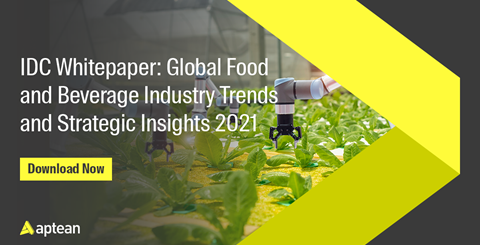Fighting Waste with Food ERP Solutions
Food waste is a hot-button issue of late, as staggering numbers are being tallied in the loss column. According to the United Nations, about 1.3 trillion tons of food, amounting to a value of approximately $1 trillion, goes wasted each year.
This is putting pressure on food and beverage businesses like yours, as you’re motivated to minimize your waste not only to conserve your resources and get the most out of the materials you purchase, but also to satisfy customers. There’s a reason “sustainability” is such a popular buzzword, after all—a recent study showed that 23% of U.S. respondents are placing a priority on sustainable options.
Considering the numerous stops along the supply chain and the many processes that organizations like yours carry out on a daily basis, there are many possibilities for food loss before it even reaches the table. Let’s examine some of the most common ways that otherwise edible products end up in the trash, as well as some strategies and tools for prevention of this waste and the role that enterprise resource planning (ERP) technology can play.
Spoilage
Food tends to spoil for one of two reasons—either by being exposed to improper storage conditions or by not being used by its expiration date. With a Rockefeller Foundation report estimating that solving for food spoilage would feed an additional 1 billion people by 2050, the potential impact of the food industry collectively addressing this issue is clear.
Critical aspects of storage conditions include temperature, humidity, integrity of sealed containers and elimination of contaminants. And as for managing expiration dates, it’s crucial to employ a “first expiry, first out” (FEFO) approach for the use of your raw materials, as well as to know the difference between “best before” dates and actual shelf life, as using only the latter can lead consumers to throwing out products that are still good.
That all adds up to a lot to keep track of, especially when your business may be using hundreds of different ingredients. Thankfully, technology can simplify this undertaking. ERP solutions purpose built for food and beverage businesses can facilitate automated checks on storage conditions (as well as alerts when levels fall or rise outside acceptable ranges) and manage your expiry data automatically to ensure FEFO methods are used.
Damage
Waste due to damage can occur anywhere along the supply chain. At the farm level, harsh weather and insects can destroy crops; at the factory, improperly maintained equipment can render otherwise viable products unsellable; and the list goes on.
Key areas to examine in your operations in order to prevent loss due to damage are packaging and handling. Researchers at Cal Poly found that8.5% of produce in disposable packaging arrives at distribution centers damaged, and 12% of fruits and vegetables in disposable packaging is damaged by the time it reaches the store—and that’s particularly relevant, considering 45% of all food waste is attributed to the fresh produce sector.
Finding the right packaging solutions and training employees on safe handling techniques is important for any manufacturer, and achieving optimal results on these fronts will necessitate carefully examining your current products and procedures.
Food ERP systems can also assist in your efforts by handling preventative maintenance scheduling and capturing accurate data up and down the supply chain, illustrating where issues are occurring and allowing you to take quick action.
Overfilling and Overserving
Overfilling—or giveaway—and overserving is another big contributor to loss, with “consumption” accounting for half of all food waste, according to the UN. Whether it’s bottles with more fluid ounces than advertised, excess quantities in packages of distinct counts or simply too much food served at a meal that must be thrown away, these are some of the more visible waste scenarios.
Because food and beverage businesses can face penalties for underfilling, they usually err on the side of caution by allowing fill variations that tend toward the upper end of the package’s capacity. That’s product that’s not only going to waste, but also a major burden on your bottom line—Northwest Analytics found in a study that cost savings of approximately 5 cents per package can be realized by reducing overfill.
With regards to overserving, which would occur at the restaurant or home level, one statistic jumps out to illustrate the problem: the average dinner plate has grown in size by 36% since the 1960s, according to Vox. This has exacerbated the waste incurred due to the inclination of servers and consumers to completely fill their plates, even if they know it is unlikely all of the food will be eaten.
A food ERP platform can help your business cut back on overfilling losses by integrating with smart technology that carefully tracks fill levels and flags errors that occur in your processes that result in giveaway. Correcting overserving is mostly a matter of training and best practices, but even there ERP can help by collecting facts and figures and creating visualizations that show just where problems are occurring so you can fix them quickly.
Finding the Fix
With so many different potential causes of food waste, there really is no one grand solution to the issue. That being said, simply being aware of these common pitfalls can improve performance and have an impact on your profitability.
And as if you needed more motivation to reduce your losses, you can also consider the environmental impacts of food waste. Nearly one-fifth of all croplands produces foods that ends up uneaten, and all that trash accounts for 21% of landfill content, making it the largest contributor by weight, according to the UN.
To really be empowered to root out issues of waste at your food business, our industry-specific solution—Aptean Food & Beverage ERP—can help. With real-time data tracking, smart automations and an integrated, unified platform across all of your departments, you’ll truly have full ownership of your operations.
Contact us today to hear more about our offerings and how they can alleviate your waste worries.
 Nederlands
Nederlands English
English



